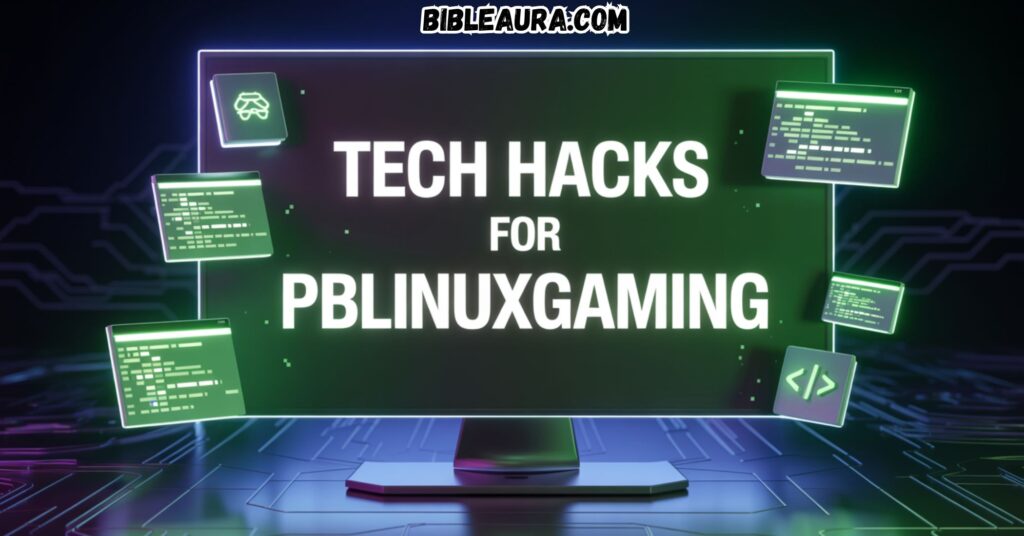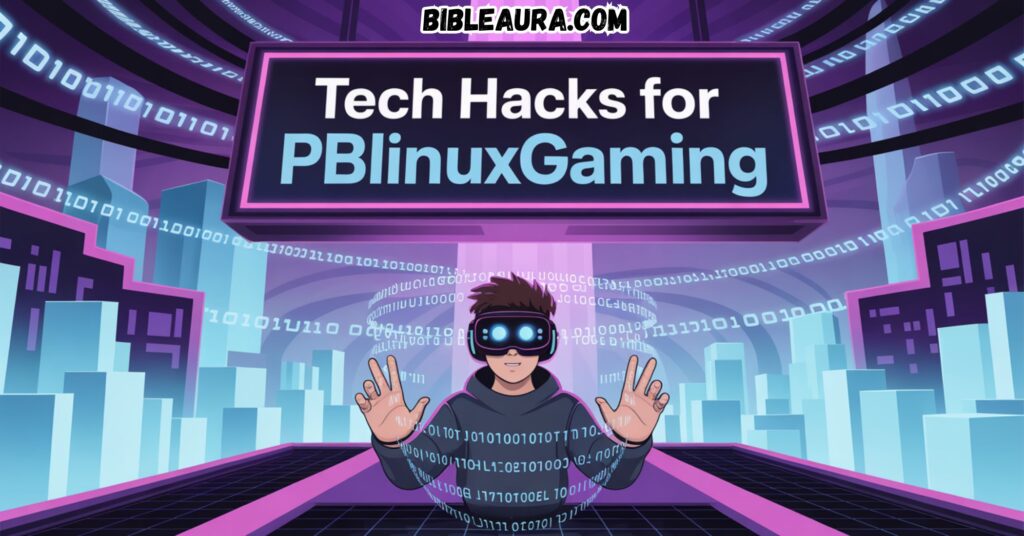In recent years, Linux gaming has gained significant traction, challenging the notion that Windows reigns supreme in the gaming world. With tools like Proton and platforms such as Steam for Linux, gamers can now relish an expansive library of titles while enjoying the benefits of an open-source environment.
This article will delve into essential tech hacks for PBLinuxGaming users, providing insights into optimizing your gaming experience, troubleshooting common issues, and enhancing performance.
Why Choose Linux for Gaming?
Choosing Linux for gaming offers numerous advantages:
- Cost-effective: Most Linux distributions are free, eliminating licensing fees.
- Flexibility: Linux allows for extensive customization, adapting to your unique gaming setup.
- Community Support: The thriving Linux community is a treasure trove of resources and support.
- Open Source: Transparency and control over your system are paramount, allowing you to modify it as needed.
This versatility makes Linux an attractive option for gamers who seek more than just a gaming console.
Current Trends in Linux Gaming
Linux gaming is experiencing a renaissance. Here are some current trends:
- Rise of Native Linux Games: More developers are releasing titles compatible with Linux natively, reducing reliance on compatibility layers.
- Impact of Proton and Steam Play: These tools have revolutionized game access, permitting many Windows games to run smoothly on Linux.
- Cross-Platform Play: Games like Dota 2 and Counter-Strike: Global Offensive are fostering interactions between Linux and Windows users.
Notable Statistics
- Over 60% of Steam users now use Linux, as reported on ProtonDB.
- The number of native Linux titles on Steam has increased by 300% in the last five years.
Essential Tools for Your Linux Gaming Setup
To optimize your gaming experience, certain essential tools are critical:
- Steam: The primary platform for Linux gaming, providing access to thousands of titles.
- Proton: A compatibility layer that allows Windows games to be played on Linux.
- Lutris: A game management tool that supports various game formats and platforms.
- Wine: Another compatibility layer, useful for running Windows applications on Linux.
- GameMode: A tool by Feral Interactive that boosts performance during gaming sessions.
Recommended Hardware
- CPU: At least a quad-core processor
- RAM: 8GB minimum
- GPU: NVIDIA or AMD with the latest drivers
- Storage: SSD for faster load times
Also Read: FTAsiatrading Technology News By FintechAsia: Your Essential Guide To Market Insights
Key Software for an Optimal Gaming Experience
Using the right software can significantly enhance your gaming setup. Here’s a closer look at some key applications:
- Discord: For real-time communication with friends while gaming.
- MangoHud: A performance monitoring tool that displays real-time metrics like FPS and CPU usage.
- PulseAudio: Helps manage audio settings for better sound control.
Package Managers and Repositories
Understanding package managers is essential for managing software on Linux. Here are the most common:
- APT (Debian/Ubuntu): Ideal for beginners, with a large repository of software.
- DNF (Fedora): A powerful alternative offering better performance and features.
How to Manage Repositories
Adding third-party repositories can expand your software options:
- Open your terminal.
- Use the command for your package manager:
- For APT:
sudo add-apt-repository ppa:repository-name - For DNF:
sudo dnf config-manager --add-repo repository-url
- For APT:
- Update your package list:
sudo apt updateorsudo dnf update.
Proton and Steam Play: Revolutionizing Game Access
Proton and Steam Play have transformed how Linux gamers access their favorite titles.
What is Proton?
Proton is a compatibility layer that allows users to play Windows games on Linux without requiring a Windows license. It translates Windows API calls into POSIX-compliant calls, making the gaming experience seamless.
Setting Up Steam Play
- Open Steam and navigate to Settings.
- Click on Steam Play.
- Check the box for “Enable Steam Play for all other titles.”
- Select the Proton version from the dropdown menu.
Best Practices for Using Proton
- Always check ProtonDB for compatibility reports on specific games.
- Use the latest version of Proton for optimal performance.
Wine and Lutris: Expanding Your Game Library
Both Wine and Lutris significantly broaden your gaming options.
Introduction to Wine
Wine allows you to run Windows applications on Linux. It’s more flexible than Proton but may require additional configuration.
Using Lutris for Game Management
Lutris simplifies managing your game library. Here’s how to get started:
- Install Lutris via your package manager.
- Use the Lutris website to find and install games.
- Configure settings for non-Steam games easily.
Managing Non-Steam Games Effectively
You can add non-Steam games to your library:
- Click on Add Game in Lutris.
- Fill in the game details and specify the executable path.

Graphics Drivers: Enhancing Visual Performance
Choosing the right graphics drivers can make a significant difference in your gaming experience.
Choosing the Right Drivers
Linux offers two main types of drivers:
- Proprietary Drivers: Often provide better performance and support for gaming.
- Open-source Drivers: More stable but can lack some features.
Comparison of Graphics Drivers
| Feature | Proprietary Drivers | Open-source Drivers |
|---|---|---|
| Performance | Excellent | Good |
| Support for New Games | Faster updates | Slower updates |
| Compatibility | Higher for gaming | Generally stable |
Installation Guide
- For NVIDIA:
- Add the repository:
sudo add-apt-repository ppa:graphics-drivers/ppa - Install the driver:
sudo apt install nvidia-driver-XX(replace XX with the latest version).
- Add the repository:
- For AMD:
- Use the open-source driver included in the kernel for optimal performance.
Also Read: Ultimate Guide To Retro Bowl 3KH0 Gameplay And Tips
Performance Optimization Techniques
Performance optimization is crucial for a smooth gaming experience. Here are some effective strategies:
System Tweaks for Improved Gaming
- Adjust swappiness value to improve RAM management during gaming sessions.
- Disable unnecessary startup applications to free up resources.
Leveraging GameMode for Automatic Optimization
GameMode is a tool that automatically optimizes your system for gaming. Install it with:
bash
sudo apt install gamemode
To activate it, launch your game with:
bash
gamemoderun <game-executable>
Real-time Performance Monitoring with MangoHud
MangoHud provides valuable insights into your system’s performance. Install it using your package manager and configure it to show overlays for CPU, GPU, and FPS.
Troubleshooting Common Linux Gaming Issues
Even with the best setup, you may encounter issues. Here are some troubleshooting tips for common problems:
Dealing with Anti-Cheat Software
Many games use anti-cheat systems that may not work well on Linux. Always check compatibility on ProtonDB before trying to play.
Resolving Audio Problems
For audio issues, consider using pavucontrol to manage your sound settings effectively. This tool provides a graphical interface to adjust audio streams and devices.
Fixing Graphical Glitches
If you experience graphical glitches, try these steps:
- Update your graphics drivers to the latest version.
- Adjust game settings to lower graphics quality.
- Use different Proton versions for compatibility.
The Future of Linux Gaming
The future looks bright for Linux gaming with emerging technologies:
- Cloud Gaming: Services like GeForce NOW and Stadia are becoming increasingly compatible with Linux, allowing for gaming without high-end hardware.
- Community Contributions: The Linux community continually improves gaming support, with developers actively engaging in creating better tools and software.
Emerging Technologies and Trends
- VR and AR: As these technologies evolve, support for Linux gaming is likely to expand.
- Cross-Platform Gaming: The trend toward cross-platform play will continue to grow, allowing Linux users to play alongside friends on other systems.
Conclusion
In summary, optimizing your PBLinuxGaming experience involves understanding essential tools, utilizing performance optimization techniques, and being prepared to troubleshoot issues as they arise.
With the right setup and knowledge, you can enjoy a rich gaming experience on Linux that rivals traditional gaming platforms.
Explore these essential tech hacks, join the vibrant Linux gaming community, and share your experiences. Together, we can continue to push the boundaries of gaming on Linux.
FAQs
What are the benefits of Linux gaming?
Linux gaming offers cost-effectiveness, flexibility, and a strong community support system, making it an attractive choice for gamers.
How does Proton enhance the PBLinuxGaming experience?
Proton acts as a compatibility layer, allowing Windows games to run seamlessly on Linux, significantly expanding the gaming library for PBLinuxGaming users.
What essential tools should I use for my Linux gaming setup?
Key tools for a successful Linux gaming setup include Steam, Proton, Lutris, and GameMode, all designed to optimize your gaming experience.
How can I troubleshoot common Linux gaming issues?
To troubleshoot common issues in Linux gaming, check compatibility reports, update drivers, and use tools like pavucontrol for audio problems.
What trends are shaping the future of Linux gaming?
Emerging technologies like cloud gaming and cross-platform play are shaping the future of Linux gaming, enhancing accessibility and user experience.
Read more knowledgeable blogs on Bible Aura

Piper McMillan is a passionate writer and educator dedicated to sharing the beauty and depth of the Bible. As the author behind the Piper McMillan website, she explores Bible verses, unlocks biblical narratives, and provides insights for living a Christ-centered life. Through warm, approachable, and inspiring articles, Piper guides readers to deepen their understanding of Scripture and apply its timeless wisdom to daily living. Her mission is to uplift, educate, and help others walk faithfully with God, rooted in His word.



